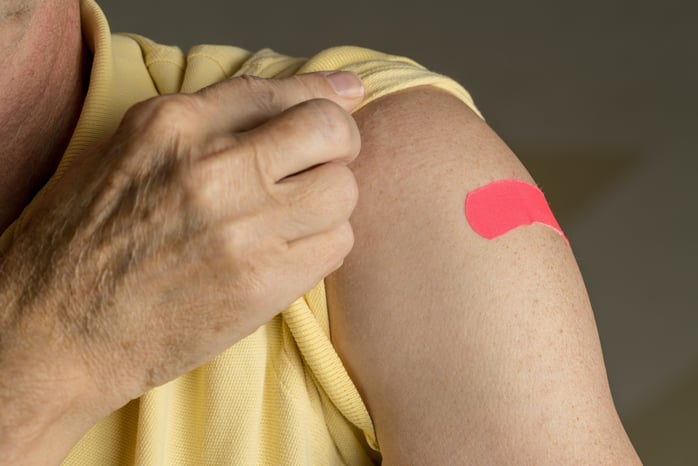
Cancer patients and survivors may be wondering if they should get a flu shot. The answer is YES. Experts aren’t sure if cancer survivors, or even patients currently undergoing treatment, are more prone to getting the flu. However, experts know one fact for sure — cancer patients and many survivors experience more serious complications from the flu.
Why Should You Get the Flu Vaccine?
Cancer patients are at increased risk for serious complications from the flu. Chemotherapy can cause a dangerous drop in the levels of specialized white blood cells (called neutrophils) that fight infections. This condition is called neutropenia, the major risk factor for developing infections, including the flu. Radiation therapy may also lower white cell counts.
Complications from the flu can include:
- Sinus or ear infections
- Bronchitis
- Dehydration
- Pneumonia
- Inflammation of the brain, heart, or other muscle tissues
- Sepsis (a life-threatening response to infection)
Whether patients are receiving chemotherapy or radiation treatments, it is still safe to take a flu shot.
The COVID-19 pandemic adds urgency to the need to get a flu shot. The flu shot doesn’t prevent COVID-19. But the flu shot protects you against the most common types of flu. Cancer patients are at higher risk for serious complications from the flu because some cancer treatments also lower your immune system’s ability to fight infections. The flu vaccine reduces the risk of you having to be hospitalized; avoiding the flu while going through cancer treatment can help you stay out of the hospital for flu-related complications. And staying out of the hospital during the pandemic is ideal.
When Should You Get the Flu Vaccine?
It takes about two weeks for the flu shot to protect you from the flu. Every cancer patient and cancer survivor should get their flu shot before the flu becomes active within their community. Given that some symptoms of COVID-19 mimic the flu, don’t wait to get your flu shot. Most experts recommend getting your flu shot by the end of October — but if you haven’t gotten your flu shot, get it as soon as possible.
According to the Centers for Disease Control and Prevention (CDC), cases of flu peak between December and February and usually begins to taper off in March. So getting your flu shot in November or even early December still protects against the flu.
Is There More than One Flu Vaccine?
There are six versions of the flu vaccine for the 2020/2021 flu season. Patients over 65 or who have a serious egg allergy should talk to their oncologist, primary care physician, or pharmacist to ensure that they receive the most appropriate vaccine.
- Standard-Dose Flu Vaccine. The most widely used flu vaccine is formulated each year for the 3 or 4 strains of flu that are forecast to be the most prevalent. This vaccine can be used for babies as young as 6 months old and people up to 64. It should not be used for people allergic to eggs.
- High-Dose Flu Vaccine. The high-dose vaccine is intended for people over 65. “High-dose,” in the case of this vaccine, indicates that the vaccine has 4 times as many antigens as the standard dose.
- Flu Vaccine with Adjuvant. Another vaccine is available for people over 65, which has an added component to boost your immune response.
- Cell-Based Flu Vaccine. This version of the flu shot is especially for persons who are allergic to eggs. It can be given to people older than 4 years old.
- Recombinant Flu Vaccine. The recombinant vaccine is another option for people with serious egg allergies. It’s intended for people over 18 years old.
- Nasal Spray Flu Vaccine. The nasal spray vaccine is also called a live attenuated influenza vaccine (LAIV). It’s intended for healthy people, ages 2 to 49. But it is not intended for use in many people, including people over 50, pregnant women, or immunocompromised persons. Talk to your oncologist before getting the nasal spray flu vaccine — either for yourself or other family members who live in the same household.
Always Talk to Your Doctor First
It’s safe for virtually every cancer patient to get their flu shot. But always talk to your doctor before you get your shot. Your oncologist is familiar with your particular diagnosis and treatment and will tell you which kind of flu shot is right for you.
Patients receiving chemotherapy or who have had a recent stem cell transplant may not develop strong protection against the flu as other people. So it’s important to talk to your oncologist.
Because cancer patients may not experience as strong an immune response as others, your household members need to get a flu shot too.
Other Ways to Protect Yourself from the Flu
The COVID-19 guidelines help protect cancer patients and their caregivers from the flu too. Here are some helpful hints to protect yourself and your loved ones.
- Stay at home if you’re not feeling well.
- Encourage those around you. Urge everyone in your family and at your workplace to get a flu shot.
- Wear a mask in public places or as directed by your medical team.
- Wash your hands often with warm, soapy water for 20 seconds. Wash your hands before eating and before touching your face.
- Use hand sanitizer or disinfectant wipes when you’re in public places. Keep hand sanitizer and wipes in your car to disinfect your hands before you touch your steering wheel. Wipe down your steering wheel and car door handles frequently.
- Avoid using cash. Use a credit/debit card or smartphone to pay for items purchased in-person.
- Order online whenever possible — especially for hard-to-find items and bulky items.
- Order groceries online for pick-up. Even if you’ve never ordered groceries this way before, this change in routine keeps you out of contact with hundreds of people. Make a list, and order every week or ten days.
- At home, use a disinfectant spray or wipe frequently. Wipe down frequently-used surfaces like doorknobs, toilet handles, and the TV remote. Don’t forget to take extra precautions with your cell phone, computer keyboard, and mouse.
- Use telemedicine when it’s available. Smart technology saves the day. Your cancer center may offer telemedicine services to provide lab and/or scan results.
- Don’t touch your hands, mouth, or eyes when you’re out in public.
- Work out. Even modest exercise helps boost your immune system.
- Stay hydrated. Especially when you’re on chemo, water helps flush out toxins. Becoming dehydrated is a major reason that many cancer patients have to go to the emergency room. Vomiting or diarrhea may cause dehydration, leading to an imbalance in electrolytes. If the imbalance in electrolytes becomes severe, you may get confused or disoriented. Going to the ER exposes you and your caregiver to people who may have the flu or COVID-19.
- Eat healthy foods. Eat plenty of fruits and vegetables — they provide valuable nutrients that help boost your immune system. Be sure to eat enough protein to help prevent muscle wasting.
- Get plenty of sleep. Don’t be embarrassed if you need a nap. Lack of sleep compromises your immune system, making it more likely that you might catch the flu or get a cold.
- Work from home, if at all possible. Many cancer patients continue to work to keep their health insurance. Cancer patients receive protection through the Americans with Disabilities Act (ADA). You are entitled to ask for reasonable accommodations. The Job Accommodation Network provides specific information for cancer patients and cancer survivors to request working from home. Because of the COVID pandemic, employers are now more familiar with setting up their employees to work remotely.
Make the flu vaccine part of your cancer survivorship plan.


